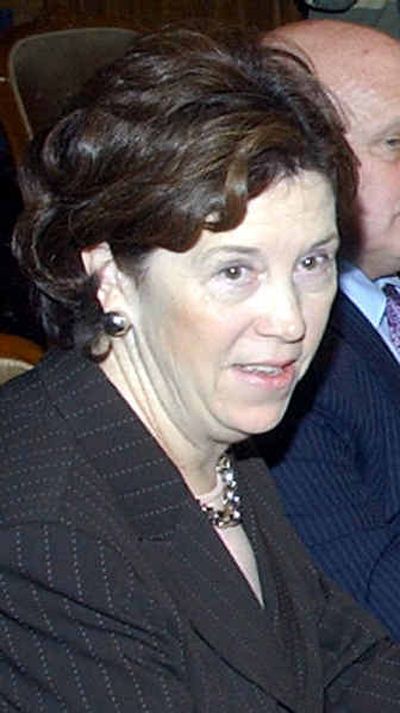U.S. putting pressure on Syria

WASHINGTON – The United States recalled its ambassador and considered further sanctions against Syria on Tuesday, a day after the fiery assassination of former Lebanese Prime Minister Rafik Hariri in downtown Beirut.
The actions signaled that the Bush administration intends to use Hariri’s death to press demands that Syria withdraw its troops from Lebanon and stop supporting terrorism, even without proof that Damascus was involved in the assassination.
Secretary of State Condoleezza Rice ordered U.S. Ambassador Margaret Scobey to return to Washington after Scobey first delivered a tough message to the government of Syrian President Bashar Assad.
State Department officials, who requested anonymity to speak more freely, said the move probably heralded a long-term downgrading of U.S. relations with Syria.
Rice and President Bush are considering additional economic and diplomatic sanctions against Damascus, beyond those the president ordered last May, the officials said.
Hariri’s assassination by a powerful car bomb Monday has raised fears of new sectarian violence in Lebanon, which has been relatively peaceful since its 15-year civil war ended in 1990.
Hariri’s backers charged through Beirut and at least two other cities Tuesday, chanting slogans against Syria, the primary power broker in Lebanon.
Syria has denied a role in Hariri’s killing, and no definitive proof of responsibility has emerged. The U.N. Security Council on Tuesday requested that Secretary-General Kofi Annan report “urgently on the circumstances, causes and consequences of this terrorist act.”
U.S. officials said the United States had no evidence of Syrian complicity in Hariri’s assassination.
Instead, State Department spokesman Richard Boucher advanced the argument that the killing undercuts Syria’s stated reason for keeping 14,000 troops in Lebanon: to maintain the multiethnic country’s stability.
“The very tragic bombing yesterday shows that that’s just plain not true,” he said. “And therefore we believe that there is no reason for them to remain there.”
Officials at Syria’s embassy in Washington didn’t return calls and e-mails seeking comment.
In September, the Security Council passed a resolution demanding that Syria withdraw its troops from Lebanon. The United States and France sponsored the measure.
The Bush administration has used diplomacy to try to get Syria to acquiesce and to halt the use of its territory by supporters of the insurgency in Iraq.
But Bush harshly criticized Syria in his State of the Union address two weeks ago, and the new moves Tuesday suggested that the White House is moving toward outright confrontation with Damascus.
Bush, acting under a 2003 law passed by Congress, imposed largely symbolic sanctions on Syria last May, including a flight ban on Syrian aircraft and a prohibition of exports other than food and medicine.
Separately, he ordered U.S. financial institutions to cut ties with the Commercial Bank of Syria because of money-laundering concerns, and froze assets in the United States that belong to Syrian individuals and government entities.
The president could implement tougher sanctions under the 2003 law – such as banning U.S. business investments in Syria and imposing travel restrictions on Syrian diplomats posted to the United States – and under other U.S. laws.
But Kenneth Katzman, a Middle East expert at the nonpartisan Congressional Research Service, said getting too tough with Damascus could put pressure on the Bush administration to disclose any evidence it had of Syrian complicity in Hariri’s assassination.
“At some point, people are going to ask where’s the evidence?” Katzman said.
Alienating Syria also could prompt it to try to play spoiler in recently revived peace efforts between Israel and the Arabs, a role Damascus has played frequently in years past.
Egyptian Foreign Minister Ahmed Abul-Gheit, in Washington for meetings with Rice and others, said Tuesday that Syria had been helping to convince Palestinian factions to abide by an informal cease-fire with Israel.
Abul-Gheit, speaking at the private Brookings Institution, expressed concern that a cycle of killings and retaliations in Lebanon might cause it to “slide into a situation that resembles … the mid-‘70s, when we had the civil war.”
Allies of Hariri, who resigned in October to protest an extension in office for pro-Syrian President Emile Lahoud, protested in Lebanese cities Tuesday and blamed Damascus for the killing. The Lebanese army went on alert.
Demonstrators in Hariri’s hometown of Sidon burned tires and attacked five Syrian workers, injuring them slightly before police arrived to extract them from the melee.
The Lebanese government said the explosion that killed Hariri and incinerated his motorcade almost certainly was caused by a suicide car bomb.
Hariri’s allies explicitly accused Syria of masterminding the attack as they appeared on television throughout the day during live coverage of condolence ceremonies at the billionaire ex-prime minister’s Beirut palace.
“This (Lebanese) regime is backed by Syria. This is the regime of terrorists and terrorism that was able yesterday to wipe out Rafik al Hariri,” Druze opposition leader Walid Jumblatt told Lebanese television.
Beirut became a ghost town overnight as shops, banks, and schools closed for three days of official mourning.